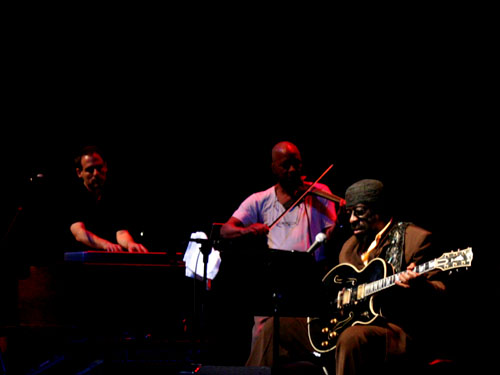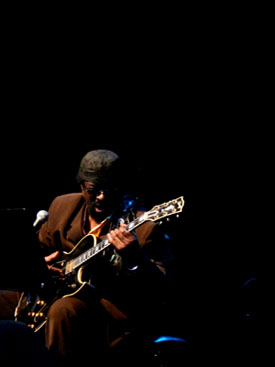Jazz Lessons With James "Blood" Ulmer
Growing up in a family that requires Saturday night recitals is a crash course in how to please a crowd. A conversation about a lifetime of commanding performances.
“Have I seen you before?” guitarist James “Blood” Ulmer asks as he ushers me into his home. His question catches me off guard. Over the years, I had seen Ulmer plenty of times. I had marveled at his captivating fusion of jazz and funk, his ineffable scampering note sequences and the raw granularity of his voice. But we had never met.
He offers me a seat at his breakfast table. Afternoon sunlight fills his spacious SoHo apartment, bathing an assortment of plants asymmetrically arranged along a row of expansive windows that open onto the street below. He picks up my flat microphone and examines it, turning the wafer-thin accessory over in his powerful hands. There’s a gracefulness in the way he handles the gadget, and I see an immediate correlation with the fluidity in which his fingers dance across the fretboard. Ulmer started out as a guitarist at age four in rural St. Matthews, S.C., shortly after the Second World War.
“When I was a kid, everyone in the family had to perform something on Saturday night,” he says. “All the big families in the South did that. You had to dance, speak, sing, whatever you did. I played guitar, and when I was nine years old, I did some quartet singing in a group called the Southern Sons. We made a little money, too.”
Ulmer traveled to New York City as a teenager in the late ‘50s while he was touring with a rhythm-and-blues band. But his artistic identity crystallized in Detroit, where he settled in 1965 and became immersed in the city’s notorious music scene, subjecting himself to ruthless self-analysis in an attempt to fashion his own guitar style. By 1969, he had become part of the lineup alongside organist “Big” John Patton and appeared on the album Accent on the Blues, which got some airplay and exposed Ulmer to a wider audience.
“Detroit was a very musical town,” he explains. “Every musician was searching for something, stretching beyond what Miles and them were doing, even though they were studying Miles at the same time. And in them days, Wes Montgomery was the indisputable champion of the guitar. But when I was in Detroit, I got away from the Wes Montgomery concept and started playing free. I came out of Detroit playing free music.”
Free music, also called free jazz, was developed in the late ‘60s by saxophonist Ornette Coleman and pianist Cecil Taylor. Coleman and Taylor never collaborated and took distinctly different approaches to composition, but both artists broke away from the predetermined melodic phrases that normally define jazz. Coleman called his method “harmolodics.” For him, melodies evolved from the musician’s intuitive responses to one another outside the framework of traditional rhythmic structures and harmonic chord progressions.

“When I moved to New York in ‘71, I had a little storefront studio in Brooklyn,” Ulmer says. “One night, Billy Higgins [Coleman’s drummer] stopped by to play my drums and told me, ‘Coleman wants to hear you.’ So he took me to Coleman’s house, where I lived for almost a year. And when I started playing with Coleman, he said that I was a natural harmolodic player. He was a mentor to me. He validated what I was doing.”
In 1978, Ulmer released Tales of Captain Black with Coleman on alto saxophone and as producer. Like most free-jazz compositions, the songs on the album have no rhythmic center, and although bassist Jamaaladeen Tacuma incorporates traces of funk, he frequently changes tempo, purposely shifting the bassline out of sync with the erratic pulse of drummer Denardo Coleman, Ornette’s son. On each of the numbers, Ulmer and Ornette Coleman bounce spasmodic phrases off one another, skirting in and out of kaleidoscopic rhythms. Tales of Captain Black could serve as a textbook example of what free jazz is all about.
And yet, such categorization is what Ulmer has sought to defy over the course of his career. In the ‘80s and ‘90s, his music exhibited a bluesier edge, and Odyssey, a 1983 release with Charlie Burnham on violin and Warren Benbow on drums, even contains bluegrass elements. The lineup is conspicuously missing a bassist, and when I mention this to Ulmer, he notes that in a jazz ensemble, an electric bass has a tendency to “lock down” other instruments, especially the guitar. By default, the electric bassist and guitarist wind up in a shared leadership role that imposes limitations on both artists and compromises their ability to improvise freely.
Projects with bassist Bill Laswell seem to be Ulmer’s lone exception to this rule. Laswell is arguably one of the greatest electric bassists of all time and played with Ulmer in the mid-’90s on South Delta Space Age, a fusion of jazz, blues, and funk that also included Parliament/Funkadelic keyboardist Bernie Worrell. Pianist Amina Claudine Myers and drummer Joseph Modeliste fleshed out this second incarnation of Third Rail, an Ulmer combo.
“Now that was a heck of a lineup,” Ulmer recalls. “The original Third Rail was me, Bill, and [Ronald] Shannon Jackson. And Bill and I had worked together on an earlier record of mine called America: Do You Remember the Love? But we didn’t want the [Third Rail] project to be under any one person’s name, so Bill brainstormed and came up with a name for the group and an album title. Bill is great with words—coming up with names, titles, and stuff like that.”
In 2001, Laswell and Worrell returned to support Ulmer on his album Blue Blood, a superb blend of jazz and blues. And although there’s a guitarist and bassist on the record, neither Ulmer nor Laswell seems constrained by the other’s playing. If anything, they’re liberators, forging ahead with their distinct musical voices, expanding the aural dimensions of each song and providing additional creative space for one another to work. Ulmer’s leads and Laswell’s basslines are so intricate and sophisticated that there’s no way that they could be interwoven; instead, they’re overlaid, giving both instruments equal prominence in every song. [Listen to “Momentarily”]
“Music is something you do to bring people a message—to give them something to hold on to and help them remember. And that hurricane can never, never, never, ever be forgotten.”
Also in 2001, Vernon Reid (Living Colour, Yohimbe Brothers), one of rock’s finest guitarists, began working with Ulmer on Memphis Blood, which would later receive a Grammy nomination for best traditional blues album. At first, Ulmer was reluctant to do the project. He had been raised on spiritual music, and with his father a minister, the risqué lyrics of many traditional blues classics had not been welcome in the household. In fact, Ulmer outright refused to record some of the songs that Reid, the producer, had suggested for the album.
“Vernon chose all the material,” Ulmer explains. “But I had to reject some of the songs. Now, ‘Back Door Man’—I didn’t want to sing that song because I ain’t no back-door man. I couldn’t tell nobody, ‘I’m a back-door man.’ I’m a front-door man. That one got on the album, though, but I’ve never performed it at a gig. You got to be careful about those songs. [Before Memphis Blood] I had never thought of doing a traditional blues record. So when Vernon made the suggestion, it was like a challenge to see if I could actually sing those songs. And it was almost like singing in church. When you’re singing in church, you’re not singing about nothing except God. So when you’re singing blues you can get a similar feeling—that you’re singing about something that’s not about you. Like ‘Spoonful’—that song is about coffee!” Ulmer exclaims, laughing. “Coffee and tea and diamonds and gold—and I don’t have none of it, so that song definitely wasn’t about me!” [Listen to “Spoonful”]
Since 2003, Reid has produced three more Ulmer albums that exhibit radically different takes on the blues idiom. No Escape From the Blues builds on the soulful, electric sound of ‘50s Chicago, while Birthright hails back to the solo-acoustic sessions of blues legend Robert Johnson’s recordings. Ulmer penned most of the material on Birthright, a collection of solemn, intensely personal songs.
“The song ‘Geechee Joe’ is about my grandfather,” he says. “I loved Geechee Joe and I had to write that song so my brothers and sisters could remember their granddad. And [Geechee Joe] did not want to work for the white man. He wasn’t working for no 50 cent’ a day. That was the message I was trying to get across. And he left everybody in South Carolina and went to Pittsburgh, where he became a freelance construction worker and numbers runner. He never took a job where he wasn’t the boss. It’s a true song.” [Listen to “Geechee Joe”]

In December 2006, Ulmer, Reid, and the Memphis Blood Blues Band headed down to New Orleans to record Bad Blood in the City, an artistic reaction to the devastation wrought on the urban poor by Hurricane Katrina. Ulmer’s passionate lyrics denounce the U.S. government’s response to the disaster, and Reid exhibits some of his best soloing since his heydays with Living Colour.
“Most of the songs on the album are based on stories I got from watching CNN,” Ulmer says. “Music for me is something you do to bring people a message—to give them something to keep, to hold on to and help them remember. And that hurricane can never, never, never, ever be forgotten. Somebody said to me, ‘Blood, it’s been a year now. Don’t you think it’s a little too late to write about [Katrina]?’ Too late? I never thought about it that way. I’m shocked that people are waiting for the whole thing to pass over.” [Listen to “Survivors of the Hurricane”]
In May, Ulmer and the Memphis Blood Blues Band kicked off their tour to promote Bad Blood in the City with a phenomenal performance at the Rich Forum in Stamford, Conn. Reid, whose astonishing guitar work is featured on the new album, remained low-key during the show and all but silenced himself four songs into the set after a fan shouted, “More Blood Ulmer in the mix!”
For nearly two hours Ulmer dexterously wove earthy, expressive leads through the other musicians’ robust rhythmic and harmonic textures, accentuating the inimitable tension and resolution that defines his solos. When someone shouted “Blood Ulmer for President!” the band answered with a rollicking rendition of Willie Dixon’s “Dead Presidents,” a song that, along with three other Dixon covers, showcased Ulmer’s searing vocals. Throughout the performance, Reid diligently provided steady rhythmic support on every number and backing vocals on Dixon’s “I Love the Life I Live (I Live the Life I Love).” That night, Rich Forum epitomized what live music is all about—a mutual elation and joy shared by both the artists and the spectators.
Ulmer roars with laughter when he recalls the days when audiences weren’t so enthusiastic. “When I was with Coleman, people would get up and leave while we were playing because they hadn’t heard anything like it before,” he says. “And when we didn’t want to get bogged down with people moving around during the performance, we’d just tell them flat out, ‘Anybody who doesn’t want to hear this shit, just get up and leave now so we can have some fun!’“
“Many musicians have lost touch with what art is,” he adds. “It has become watered down so badly. Music has to represent something, but it has become too integrated. Martin Luther King integrated people. But now, you’ve got integrated music—people combining some shit to the point where it don’t mean nothing to nobody,” he says, laughing. “As a musician, you have a job to do. You’re a representative of someone’s culture and your music has to represent something, too.”
